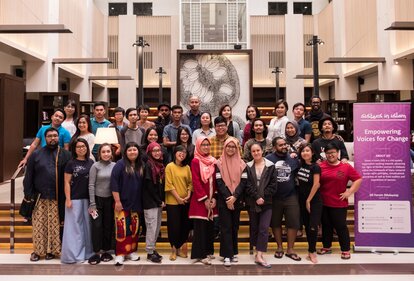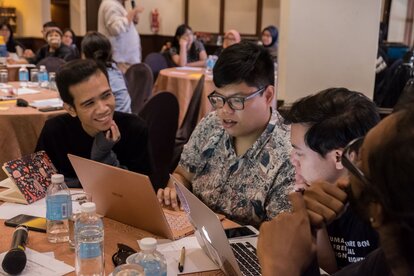Event
Gender Justice in the Human Rights Discourse

Aiming to create and solidify network among the youths, enhance and build knowledge and critical thinking in relation to gender within the human rights discourse, Sisters in Islam conducted a 3 days workshop on gender equality for the youth and people working with youth in Sabah.
The workshop was attended by participants from a diverse background, cis-gender and trans persons, varied range on the understanding of human rights concept, various social background including socioeconomic status, education and spoken languages. In the spirit of inclusivity therefore the workshop was conducted in bilingual (English and Malay language) and local dialect. Despite their assorted differences, they have given their utmost cooperation which has contributed to the success of the workshop.

The workshop comprised of 9 sessions where the participants were exposed to federal constitutional law, knowledge building on women's rights and gender justice issues, on creating network, organising and mobilising among themselves and with others.
The “Is Malaysia a Democracy Country?” session was conducted by Muhammad Afiq bin Mohamad Noor, exposed the participants to the democracy practice in Malaysia, the fundamental liberties afforded in the Federal Constitution, how Islam as the religion of the Federation affects the making of laws and policies, shaping norms and mindsets as the effect trickle down to society. How these laws and policies affecting the lives of marginalized communities, including women, sexual minorities etc., and the status of Malaysia human rights international conventions.
The session Women's Rights Movement in Sabah was conducted by Winnie Yee, who gave an overview on the women’s rights wave in Sabah, especially the one by SAWO, the organization she is currently a president. It was a more laidback session by Winnie sharing SAWO and her personal experiences maneuvering women’s rights issue, violence against women, at that time was the primary campaign, engaging with the government and grassroots.
Dorian conducted 2 sessions back to back entitled: Back to Basic 1: Introduction to Gender and Back to Basic 2: Intersectionality. These sessions gave the participants’ an outlook to Sexual Orientation Gender Identity Expression (SOGIE). He outlined the gender and sexuality narratives within the context of Malaysia as well as the Southeast Asia region, capturing some historical background during the colonial time, how it influenced the laws in Malaysia then and now. This session also encapsulates the regression intolerance especially towards the trans community as the religious conservatism is rising in gradual manners transcending the people and the government.
The seventh session was conducted by Muhammad Afiq bin Mohamad Noor and followed by Fadiah Nadwa, on the Joint Responsibility in Gender Discourse. While Afiq shared concepts of justice and compassion within the Islamic discourse pertaining to gender, Fadiah took on the misconceptions surrounding feminism, how it relates to the fight against gender injustice, and the importance to come together to resist against any kinds of discrimination that dehumanize any persons.
Fadiah Nadwa Fikri led the Gender discourse in the Civil Society Movement session. The 75 minutes session was compressed with knowledge sharing on the involvement of young people now and then globally and in Malaysia in their fight for human rights, the history and concept of feminism and the importance of the concept of intersectionality within the human rights movements. A lot of questions coming from the floor were on feminism. Based on the participants’ feedback, many deemed this session as one of the most impactful and awakened session as they came to realize many young people all around the world, now and then, are leading the change they want to see in their community and among their peers. This has given them inspirations on how to create their own network.
The Sabah Youth in the Civil Society Movement session was a sharing session by youth advocates, Ana Jonessy, from BENTARAKATA and Kenneth, representing GSAKK. Each of the youth activists shared about their organization and work that they do, the challenges and obstacles they are facing, and their engagements with youth.

During the workshop, participants were divided into 5 working groups to produce 5 different campaigns on issues tailored around toxic masculinity, gender-based violence, lack of safe spaces, rising of conservatism among youths and sexuality that ended in them presenting their ideas. The winning team presented their ideas in the form of a video on a sexual harassment campaign targeted at the trans community. In the video, they interviewed a couple of trans persons to tell their stories and experiences dealing with sexual harassment as a form of gender-based violence.